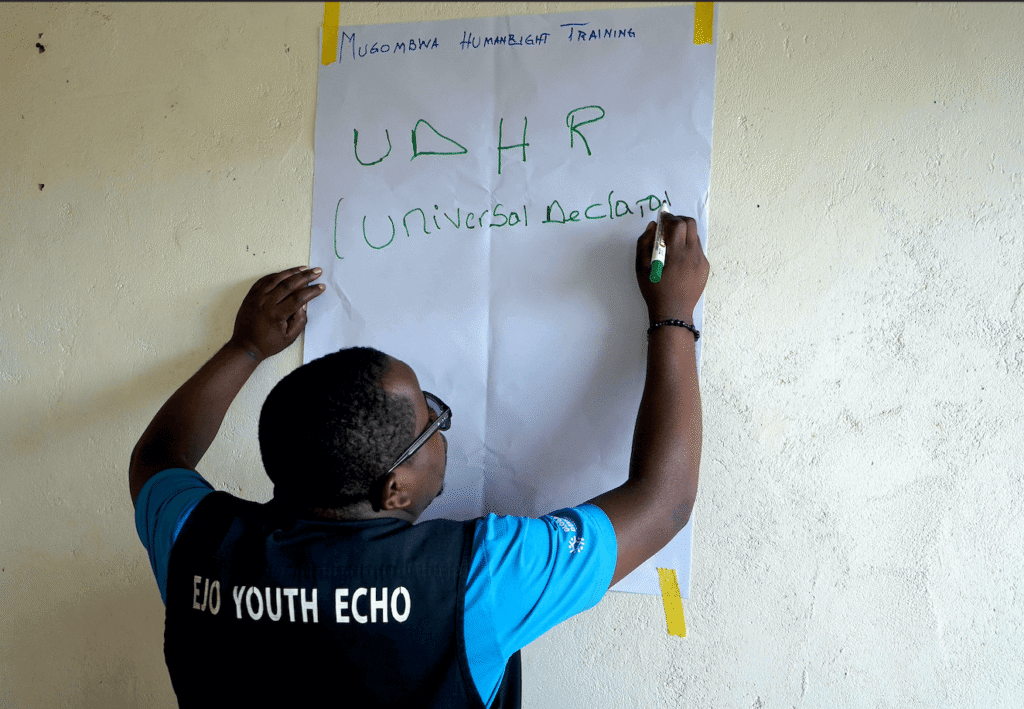Nyiramubande Journalists from Mugombwa Camp and Host Community Trained to Raise Awareness on Human Rights

A transformative four-day training workshop held in Mugombwa has left a profound impact on local journalists and refugee participants, equipping them with knowledge about human rights, refugee law, and media advocacy.

Organized with a focus on education, empowerment, and professional development, the training brought together journalists, refugee leaders, youth representatives, students, and persons with disabilities from the Mugombwa refugee camp and surrounding areas. The goal was clear: to increase awareness of the Universal Declaration of Human Rights and improve communication on key legal and social issues affecting refugees.
Key Outcomes: Growing Awareness and Changing Perspectives
Participants showed significant changes in knowledge, attitudes, and professional practices following the sessions. A notable shift was seen in their understanding of international human rights standards and Rwanda’s national laws, particularly those concerning refugee status, the right to work, and education access.
Journalists demonstrated increased curiosity and engagement, asking questions and participating actively in discussions around legal protections and ethical media practices. Refugee participants also reflected a newfound understanding particularly around legal accountability. Many had previously believed that refugee status exempted them from legal prosecution. The training clarified that all residents, regardless of their status, are subject to the laws of the host country.
Equally important was the clarification of refugee rights. Many participants learned, for the first time, that they are entitled to work in Rwanda, with the exception of specific professions such as those in national security. The right to education was also emphasized, empowering attendees with practical knowledge they can now share within their communities.
Media for Human Rights: Practical Skills for Journalists
A key component of the training involved script writing and radio spot production. Journalists were guided through the process of transforming human rights articles into accessible and impactful radio messages. Participants practiced writing scripts and recording spots either solo or in pairs, with the aim of broadcasting these messages to raise awareness among broader audiences, especially within refugee communities.
These radio spots are expected to become vital tools in community education, ensuring that the lessons learned during the workshop reach even the most remote listeners.
Gender Gaps: Challenges and Opportunities
The training revealed important gender dynamics that influenced participation and engagement. While the majority of attendees were women, male participants were generally more vocal and inquisitive. Some women and girls were observed to be less engaged, hesitant to present during group activities, and occasionally arrived late.
These trends point to ongoing cultural and social barriers that can limit women’s access to knowledge and self-advocacy, even within refugee communities. Addressing these gaps through tailored outreach and mentorship could significantly improve female participation in future sessions.
Reaching Diverse Social Groups
Beyond gender dynamics, the project had a varied impact on different social groups. Several participants were refugee leaders, youth representatives, university students, and persons with disabilities each playing a crucial role in shaping the future of their communities.
By targeting these groups, the training aimed not just to educate, but to amplify voices and create a ripple effect of knowledge sharing. Organizers are hopeful that these individuals will become ambassadors of human rights within their respective networks.

Looking Ahead
This human rights training has laid the groundwork for more informed journalism, empowered refugee voices, and greater community awareness. By combining legal education with practical media skills, the project has planted seeds of change that could shape dialogue and action in Mugombwa and beyond.
As the recorded radio spots begin airing in different locations, the messages developed during these sessions are expected to continue resonating educating, inspiring, and empowering communities to stand up for their rights and responsibilities.

